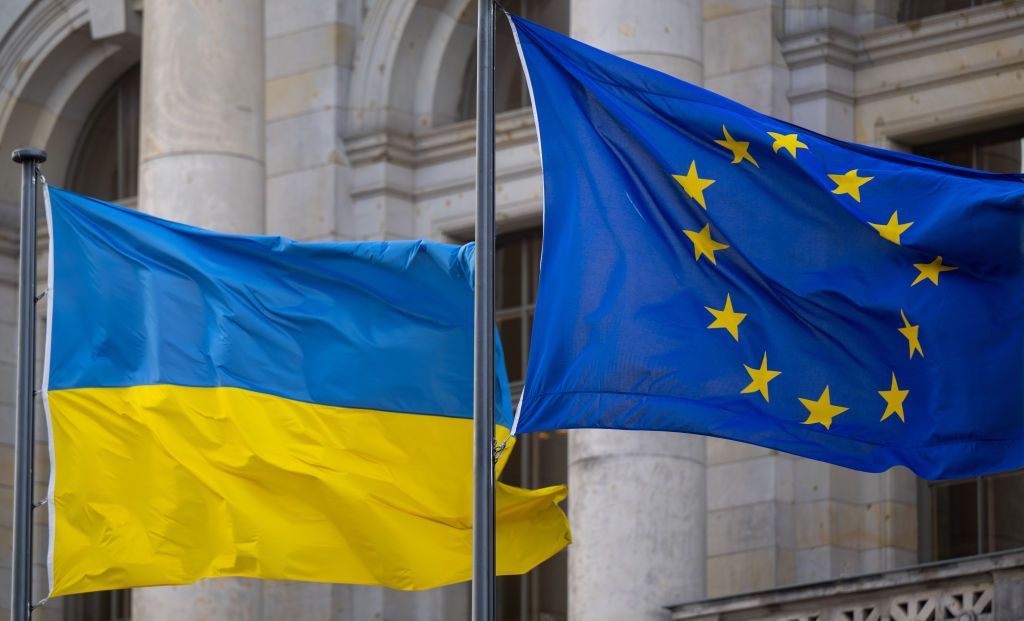"We have a plan B and a plan C. But our focus is plan A, the essence of which is to get everyone's support" for Ukraine's accession, EU foreign policy chief Kaja Kallas said.
"(T)he presence at the Victory Parade of a country that bombs cities, hospitals, and daycares, and which has caused the deaths and injuries of over a million people over three years, is a shame," Polish Prime Minister Donald Tusk said.
"According to the participants of the performances, their goal is to remind the civilized world of the barbaric actions of Moscow, which for many years and decades has systematically violated international law," a source in Ukraine’s military intelligence agency (HUR) told the Kyiv Independent.
"I have great hope that an agreement for a ceasefire in Ukraine will be reached this weekend," German Chancellor Friedrich Merz said on May 9, shortly before traveling to Kyiv alongside the leaders of France, Poland, and the U.K.
U.K. Prime Minister Keir Starmer, French President Emmanuel Macron, German Chancellor Friedrich Merz, and Polish Prime Minister Donald Tusk will arrive in Kyiv early on May 10.
The United States embassy in Kyiv on May 9 issued a warning that Russia could launch "a potentially significant" attack in the coming days, despite Putin's self-declared Victory Day "truce."
The sanctioned oil tankers have transported over $24 billion in cargo since 2024, according to Downing Street. The U.K. has now sanctioned more shadow fleet vessels than any other country.
The sanctions list includes 58 individuals and 74 companies, with 67 Russian enterprises related to military technology.
Washington and its partners are considering additional sanctions if the parties do not observe a ceasefire, with political and technical negotiations between Europe and the U.S. intensifying since last week, Reuters' source said.
Despite the Kremlin's announcement of a May 8–11 truce, heavy fighting continued in multiple regions throughout the front line.
Putin has done in Russia everything that Luiz Inacio Lula da Silva had been against in Brazil.
EU to impose restrictions on export of Ukrainian agriculture products, agrees to free trade extension

The European Union announced on April 8 that it had reached a provisional deal with European Parliament representatives to extend the suspension of import duties and quotas on Ukrainian exports to the EU until June 2025, but with new restrictions on agriculture products.
If formally adopted, the new restrictions will reintroduce tariff quotas on imports of poultry, eggs, sugar, oats, maize, groats, and honey, if the average volume of exports exceeds those of previous years. According to a press release, the EU seeks to impose restrictions to take "into account any adverse impact on the market of one or several member states (as is the case now)."
The agreement still needs to be voted on by European lawmakers.
For months, protesting Polish and Romanian farmers and truckers were at the centre of blockades at Ukrainian border crossings, protesting the economic impacts of a free trade agreement that have sparked worries about uneven competition and risks to domestic production.
According to protestors, grain imports in countries adjacent to Ukraine soared, distorting local markets and causing local farmers' grain to fall in price, which led to outcries and restrictions on both national and EU scales.
In January, Polish Agriculture Minister Czeslaw Siekierski said he is "fundamentally opposed" to a prolongation of the EU's free trade regime with Ukraine, calling instead for a "gradual, mutual liberalization."
In its statement, the EU noted it was committed to enhancing "monitoring of imports of grain, in particular wheat, and to use of the tools at its disposal in the event of market disruptions."
The EU introduced a free trade agreement for Ukraine to overcome export restrictions following Russia's full-scale invasion and the blockade of Ukraine's Black Sea ports in June 2022.
The current trade deal is set to expire on June 5, 2024. If formally adopted by the EU Council, the extended agreement will take effect on June 6.
Most Popular

After 3 years of full-scale war in Ukraine, Europe announces plan to ban all Russian gas imports

Ukraine, Europe's ceasefire proposal includes US security guarantees, no recognition of Crimea, Reuters reports

Journalist Roshchyna's body missing organs after Russian captivity, investigation says

After Russia's deadly attack on Kyiv, Vance reposts denunciation of Zelensky

Ukrainian sea drone downs Russian fighter jet in 'world-first' strike, intelligence says
Editors' Picks

How medics of Ukraine’s 3rd Assault Brigade deal with horrors of drone warfare

As Russia trains abducted children for war, Ukraine fights uphill battle to bring them home

'I just hate the Russians' — Kyiv district recovers from drone strike as ceasefire remains elusive


